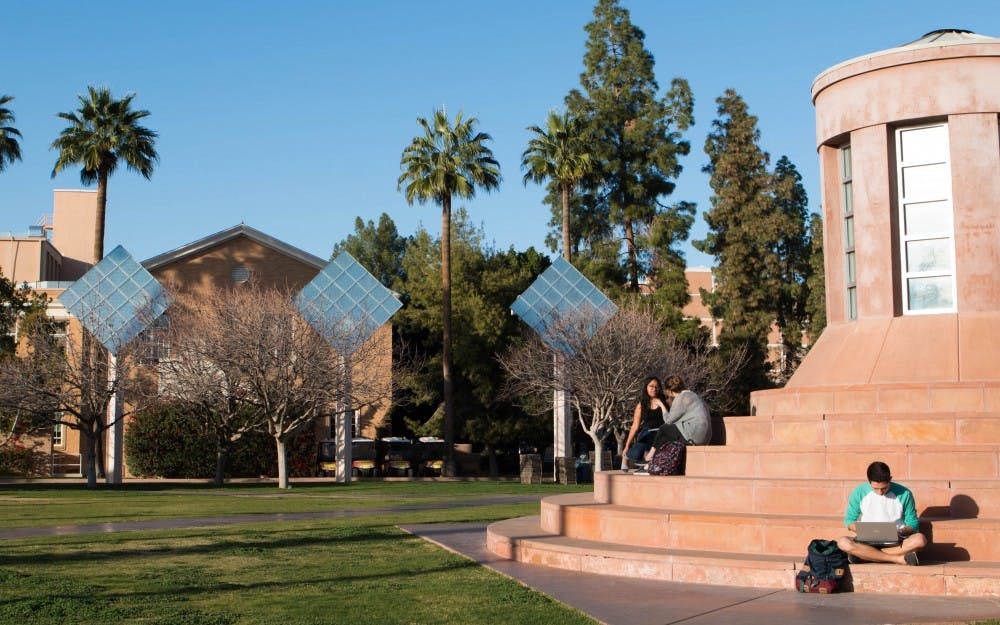Funding for ASU solar research is safe for now, ASU academics said, following the passing of a federal budget that rebuked the Trump administration's proposed steep cuts to renewable energy research.
H.R. 1625, known as The Consolidated Appropriations Act, was signed into law on March 23 and increased funding by 14 percent to the Energy Efficiency and Renewable Energy Office, which provides millions in funding to ASU for solar energy research.
ASU professors and solar researchers said Trump's proposal, which called for a nearly 70 percent cut to the EERE, would have endangered some of ASU's new solar funding projects.
The Solar Energy Technologies Office is responsible for awarding money to universities, including ASU.
Over 20 percent of the money SETO awarded as part of its Photovoltaic Research and Development funding program over the last two years went to ASU. Zachary Holman, an assistant professor who runs the Holman Research Group at ASU said SETO is the largest funder for ASU solar research.
Both SETO and the EERE are under the umbrella of the Department of Energy.
SETO received a 16 percent increase in funding from the recent congressional budget, according to EERE.
The news came as relief to Holman, whose research group works with new solar technologies.
"I think the majority of us are relieved," Holman said. "We were prepared for the worst. We got something much better than the worst. In-fact, it’s better than it was last year."
A spokeswoman for EERE said in an email that the millions of dollars of funding ASU receives would not change for the University's current solar projects.
Holman said he is still weary about the lack of reliability from the federal government.
"The outcome in this case was positive. It doesn’t mean that I’m hopeful for next year," Holman said. "I think we have to soldier on and do our best work with the resources we have at hand (and) just realize that it's hard to plan at this moment for more than a year out."
Holman said SETO offered fewer opportunities for funding over the past year, which led to fewer proposals from his group.
"I think it was because ... they didn’t even know what their budgets were going to be for 2018, the year we're in," Holman said. "So, they simply could not ask for people to send in proposals because they didn't know whether they had any money to give out."
Harvey Bryan, a senior sustainability scientist at the Julie Ann Wrigley Global Institute of Sustainability, said appointees within the Department of Energy could still clog up spending money.
"A lot of the new managers that have been appointed to the Department of Energy are ... very hostile toward renewables," Bryan said. "They can slow things up, even though ... the money has been appropriated by Congress."
Bryan said the White House should propose a better budget next time.
"I think the White House budget was poorly crafted," Bryan said. "It was embarrassing I think ... for some of the secretaries of various agencies."
Zhengshan Yu, a research professor working on solar technology in the Holman Research Group, said he was somewhat concerned about Trump's proposed budget, but he was happy to hear that the funding for solar research wouldn't be cut.
"I think that's great news for us, especially for young professionals who want to do research in this country on solar," Yu said.
Holman said some good came out of the the threat of losing funding. He explored different areas to use solar panel technology, such as heat insulating windows and anti-bacterial coatings.
"Sure, it made me think outside of our usual 'solar box' a bit, and I’ve been enjoying that," Holman said. "But I’m also very grateful that we have the opportunity to continue doing solar research at the levels that we were (at) before, because it's incredibly important to our country, to our world, to the future of human-kind."
Clarification: The Solar Energy Technologies Office awards Universities through its Photovoltaic Research and Development funding program.
Reach the reporter at cscragg@asu.edu or follow @monsoonchaser on Twitter.
Like State Press on Facebook and follow @statepress on Twitter.




